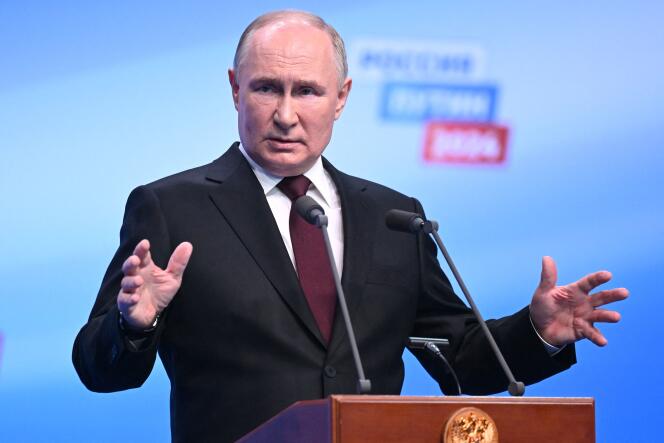
Against those who would dream of seeing it weak or disunited, Russia has presented a united front, making itself look monolithic to the point of caricature. In addition to the personal backing of Vladimir Putin, who has been re-elected to power for a further six-year term, this unity was the message sent by the results of the Russian presidential election, which came to a close after three days of voting on Sunday evening, March 17. On Monday morning, the near-final figures showed an exceptionally high 87.32% of the vote for the 71-year-old incumbent, who was dubbed "national leader" on television on Sunday evening. Turnout was announced as being 74.22%.
With this result, Putin has surpassed his previous record set in 2018 – 76% of the vote – and moves from results worthy of Belarus's leader to those practiced by Turkmenistan's baroque dictatorship. Barring an accident, by the end of this term in 2030, Putin will set another record by surpassing Joseph Stalin's longevity at the Kremlin.
The election had been planned to coincide with the 10th anniversary of the "reattachment" of Crimea to Russia – the great achievement of Putin's first quarter-century in power. However, it was overshadowed by conflict: The three-day voting period was marred by bombardments and armed incursions into the country's southern regions, drone attacks, and incidents at some polling stations that appeared to be orchestrated from abroad.
Here, too, the results have been touted as proof of Moscow's determination. In Belgorod, the region most affected by the clashes, Putin received 96.45% of the vote. Similarly, in the Russian-occupied regions of Donetsk and Zaporizhzhia, he officially secured 95% and 92% of the votes, respectively. In Chechnya, his score was 99.3%. Even in Moscow, which is notoriously a hotbed of dissent, Putin won 85.3% of the vote.
This climate of heightened tension has probably reinforced Putin's real support among a significant part of the population. Such is the genius of the Kremlin's propagandists: They have successfully transformed the narrative to portray the invasion of Ukraine as an act of Western aggression, and what is essentially a war of conquest has been reframed as an existential struggle for Russia's "traditional values" or "sovereignty."
War on the minds of voters
At an impromptu press conference at his headquarters on Sunday evening, Putin himself attributed the strong turnout figures to the fact that "Russia is defending its right to develop [itself] with arms in hand." After thanking the voters, he devoted most of his speech to geopolitical issues. He mentioned the possibility of a world war, the annexation of Ukraine's Kharkiv region, and made a vague reference to French President Emmanuel Macron's proposal for a truce during the Olympics.
You have 67.97% of this article left to read. The rest is for subscribers only.